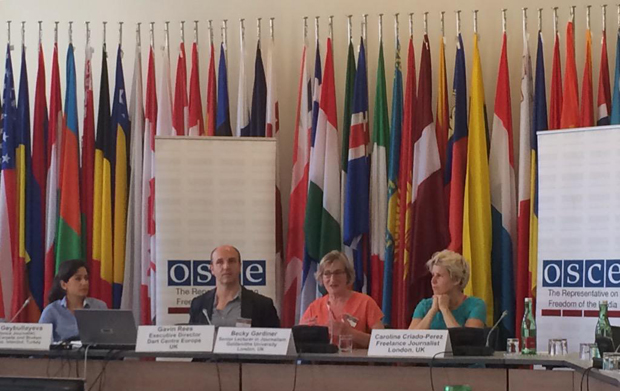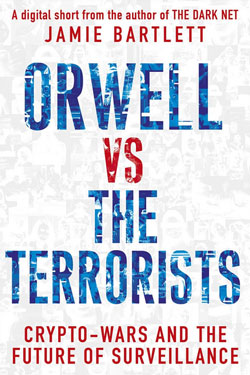5 Sep 2016 | Events, United Kingdom
Index on Censorship and Demos will hold a panel discussion at Conservative Party Conference to explore the implications of the UK government’s Counter-Extremism and Safeguarding Bill.
Striking the right balance between strengthening national security measures and safeguarding civil liberties is a challenge faced by any attempt to counter terrorism. As the government guards against the spread of extremist ideologies, it will need to ensure new powers for law enforcement do not impinge upon citizens’ civil liberties or have the unintended effect of further alienating those young people vulnerable to radicalisation. This fringe event will explore the legal and democratic implications of the bill, as well as the practicalities surrounding enforcement.
Date & Time
Tuesday 4th October, 1230 – 1400
Speakers
Sarah Newton MP, Parliamentary Under Secretary of State at the Home Office (invited)
Dominic Grieve MP, Chair of the Intelligence and Security Committee (invited)
Rachael Jolley, Index on Censorship
Rick Muir, The Police Foundation
Louis Reynolds, Demos
Chair: Kate McCann, The Telegraph (invited)
Venue
Room 107, Jurys Inn, Birmingham (map)
Tickets: Free. No registration required for this fringe event.
22 Sep 2015 | Austria, mobile, News and features, United Kingdom

Panelists at the OSCE meet on online attacks against journalists: writer Arzu Geybulla; Gavin Rees, Europe director of the Dart Center for journalism and trauma; Becky Gardiner, from Goldsmiths, University of London; journalist Caroline Criado Perez
“This is not something that only ‘ladies’ can fix,” emphasised Dunja Mijatovic, the OSCE’s Representative on Freedom of the Media at an expert meeting on the safety of female journalists in Vienna on 17 September 2015, which Index on Censorship attended.
The importance of collectively tackling the growing problem became an overarching theme of the conference. “There is a new and alarming trend for women journalists and bloggers to be singled out for online harassment,” said Mijatovic, while highlighting the importance of media, state and NGO voices coming together to address the abuse.
Arzu Geybulla and Caroline Criado Perez, journalists from Azerbaijan and the UK respectively, started the meeting with moving testaments of their own experiences. Despite covering very different topics, they have received shockingly similar threats – sexual, violent and personal. “Shut your mouth or I’ll shut it for you and choke you with my dick” was one of the messages received by Perez after she campaigned for a woman to feature on British banknotes.
Although male journalists also receive abuse, women experience a two-fold attack, including the gendered threats. Think tank Demos has estimated that female journalists experience roughly three times as many abusive comments as their male counterparts on Twitter.
The problem, said Perez, was not just the threats but how the women who receive them are then treated. “Women are accused of being mad or attention seeking, which are all ways of delegitimising women’s speech,” she said. “People told me to stop, close my Twitter account, go offline. But why is the solution to shut up?” She added: “This is a societal problem, not an internet problem.”
“Labelling a person, and making that person an object, is particularly common in Azerbaijan,” said Geybulla, an Azeri journalist and Index on Censorship magazine contributor who was labelled a traitor and viciously targeted online after writing for a Turkish-Armenian newspaper. “Our society is not ready to speak out. You can’t go to the police. The police think it must be your fault.”
The intention of the meeting was to highlight the problem, while also proposing courses of actions. Suggestions included calls for more education in digital literacy; more training for police; more support from editors and media organisations, and from male colleagues. There was some disagreement on whether the laws were robust enough as they stand, or needed an update for the internet age.
Becky Gardiner, formerly editor of Guardian’s Comment is Free section, spoke about how her own views on dealing with online abuse had changed, having initially told writers they should develop a thicker skin. “It is not enough to tell people to get tough. Disarming the comments is not a solution either. That genie is out of the bottle.” Gardiner, who is now a lecturer at Goldsmiths, University of London, is working on research into the issue, as commissioned by the Guardian’s new editor, Kath Viner.
It was suggested that small but crucial steps could be taken by media organisations to avoid inflammatory and misleading headlines (which are not written by the journalist, but put them in the firing line) and to be careful of exposing inexperienced writers without preparation or support. Sarah Jeong from Vice’s Motherboard plaform said, in her experience, freelancers often came the most under attack because they don’t have institutional backing.
The OSCE said this will be the first in a series of meetings, with the aim of getting more organisations to take it serious and to produce more concrete courses of action.
Read more about the online abuse of women in the latest issue of Index on Censorship magazine, with a personal account by Gamergate target Brianna Wu and a legal overview by Greg Lukianoff, president of the Foundation for Individual Rights in Education (Fire).
Tweets from OSCE’s #FemJournoSafe conference:
https://twitter.com/julieposetti/status/644456066432937984
12 Feb 2015 | Digital Freedom, mobile, News and features, United Kingdom
In his new ebook, tech expert Jamie Bartlett describes what he sees as the long-term ‘Snowden effect’: the explosion of new ways to keep online secrets and protect privacy, and the challenges that presents for state security services. In this extract, Bartlett uncovers some of the more revolutionary plans in the privacy pipeline.
Motivated by an honourable desire to protect online freedom and privacy, hundreds of computer scientists and internet specialists are working on ingenious ways of keeping online secrets, preventing censorship, and fighting against centralised control. A veritable army motivated by a desire for privacy and freedom, trying to wrestle back control for ordinary people. This is where the long-term effects will be felt.
Soon there will be a new generation of easy-to-use, auto-encryption internet services. Services such as MailPile, and Dark Mail – email services where everything is automatically encrypted. Then there’s the Blackphone – a smart phone that encrypts and hides everything you’re doing. There are dozens – hundreds, perhaps – of new bits of software and hardware like this that cover your tracks, being developed as you read this – and mainly by activists motivated not by profit, but by privacy. Within a decade or so I think they will be slick and secure, and you won’t need to be a computer specialist to work out how they work. We’ll all be using them.
And there are even more revolutionary plans in the pipeline. An alternative way of organising the internet is being built as we speak, an internet where no one is in control, where no one can find you or shut you down, where no one can manipulate your content. A decentralised world that is both private and impossible to censor.
Back in 2009, in an obscure cryptography chat forum, a mysterious man called Satoshi Nakamoto invented the crypto-currency Bitcoin.* It turns out the real genius of Bitcoin was not the currency at all, but the way that it works. Bitcoin creates an immutable, unchangeable public copy of every transaction ever made by its users, which is hosted and verified by every computer that downloads the software. This public copy is called the ‘blockchain’. Pretty soon, enthusiasts figured out that the blockchain system could be used for anything. Armed with 30,000 Bitcoins (around $12 million) of crowdfunded support, the Ethereum project is dedicated to creating a new, blockchain-operated internet. Ethereum’s developers hope the system will herald a revolution in the way we use the net – allowing us to do everything online directly with each other, not through the big companies that currently mediate our online interaction and whom we have little choice but to trust with our data.
Already others have applied this principle to all sorts of areas. One man built a permanent domain name system called Namecoin; another an untraceable email system call Bitmessage.
Perhaps the most interesting of all is a social media platform called Twister, a version of Twitter that is completely anonymous and almost impossible to censor. Miguel Freitas, the Brazilian who spent three months building it, tells me he was sparked into action when he read that David Cameron had considered shutting down Twitter after the 2011 riots. ‘The internet alone won’t help information flow,’ Freitas says, ‘if all the power is in the hands of a few people.’
This trend towards decentralised, encrypted systems has become an important aspect of the current crypto-wars.† MaidSafe is a UK start-up that, in a similar way, wants to redesign the internet infrastructure towards a peer-to-peer communications network, without centralised servers. Its developers are building a network made up of contributing computers, with each one giving up a bit of its unused hard drive. You access the network, and the network accesses the computers. Everything is encrypted, and data is stored across the entire network, which makes hacking or spying extremely difficult, if not impossible.
Nick Lambert, the Chief Operating Officer for MaidSafe, explained to me the vision. When you open a browser and surf the web it might feel like a seamless process, but there are all manner or rules and systems that clutter up the system: domain name servers, company servers, routing protocols, security protocols. This is the stuff that keeps the internet going: rules that route your request for traffic, servers that host that web page you’re after, systems that certify for your computer that the site you’re trying to access isn’t bogus. Because it all happens at the speed of light, it doesn’t feel cluttered up, of course.
But all these little stages and protocols create invisible centres of power, explains Nick – be they governments, big tech companies or invisible US-based regulators – and they are all exercising control over what happens on the net. That’s bad for security, and bad for privacy. MaidSafe strips all this out. The end result, says Nick, will be a network that is very difficult to censor and offers more privacy. ‘Even if we wanted to censor users’ content, we couldn’t – because with this system we don’t know or have access to anything the users do.
They’re in control.’ Nick accepts some people will misuse it – but that’s true of almost any technology. ‘Kitchen knives can cause harm,’ he says, ‘but you wouldn’t ban kitchen knives.’
As I see it, this powerful combination of public appetite and new technology means staying hidden online will become easier and more sophisticated. It might feel unlikely at a time when every click and swipe is being collected by someone somewhere, but in the years ahead, it will be harder for external agencies to monitor or collect what we share and see; and censorship will become far more difficult. A golden age of privacy and freedom. Perhaps.
* You’ve probably heard of this pseudonymous digital cash because it was, and still is, the currency of choice on the illegal online drugs markets.
† And increasingly, I predict, politics. Although no political parties – save the occasional fringe party – have given any thought to what crypto-currencies might mean. What does a modern centre-left party think of crypto-currency, or of blockchain decentralisation? They have no idea.
@JamieJBartlett is the director of Centre for the Analysis of Social Media, Demos and a tech blogger for @telegraph.
This extract was published on 12 February 2015 at indexoncensorship.org with the author’s permission.


